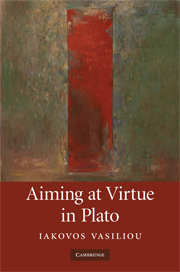Book contents
- Frontmatter
- Contents
- Acknowledgements
- Introduction
- Chapter 1 Socrates and the supremacy of virtue
- Chapter 2 Determining virtue in the here and now: Socrates in the Apology and Crito
- Chapter 3 The supremacy of virtue in the Gorgias
- Chapter 4 Trying (and failing) to determine what virtue is
- Chapter 5 Socrates and Thrasymachus: Republic 1
- Chapter 6 The benefits of injustice
- Chapter 7 Early education and non-philosophers in the Republic
- Chapter 8 Aiming at virtue and determining what it is
- Chapter 9 Epilogue
- Bibliography
- Index locorum
- General index
Chapter 2 - Determining virtue in the here and now: Socrates in the Apology and Crito
Published online by Cambridge University Press: 22 September 2009
- Frontmatter
- Contents
- Acknowledgements
- Introduction
- Chapter 1 Socrates and the supremacy of virtue
- Chapter 2 Determining virtue in the here and now: Socrates in the Apology and Crito
- Chapter 3 The supremacy of virtue in the Gorgias
- Chapter 4 Trying (and failing) to determine what virtue is
- Chapter 5 Socrates and Thrasymachus: Republic 1
- Chapter 6 The benefits of injustice
- Chapter 7 Early education and non-philosophers in the Republic
- Chapter 8 Aiming at virtue and determining what it is
- Chapter 9 Epilogue
- Bibliography
- Index locorum
- General index
Summary
What we have discovered in chapter one about SV and Socrates' relationship to it should lead us to expect that Socrates would be in a particularly difficult situation when it comes to action. Given his commitment to SV, he must do the virtuous action or at least avoid doing the vicious action, and yet, given his disavowal of knowledge of what virtue is, he seems to have no way of knowing which action is or is not virtuous. How does he decide, then, whether to get Leon as he was ordered or whether to go to battle, how to conduct his trial, and, in the Crito, whether or not to escape from prison? We shall see that he has two ways of dealing with this predicament: sometimes his daimonion comes to the rescue and simply tells him that a certain token action he is contemplating is contrary to virtue; that is, the daimonion resolves the outstanding determining question for him. At other times, such as in the Crito where there is no mention of the divine sign, Socrates says that he follows the argument that seems best to him upon reflection (Cr. 46b4–6).
Aside from particular decisions to engage in certain conversations, it is only in the Apology and Crito that we witness Socrates attempt to determine what the virtuous thing to do is in the hic et nunc. Especially in the argument of the personified Laws (Cr. 50a–54c), Socrates deliberates between two specific “actions”: remaining in prison, or escaping.
- Type
- Chapter
- Information
- Aiming at Virtue in Plato , pp. 46 - 90Publisher: Cambridge University PressPrint publication year: 2008



